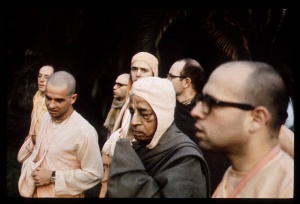CC Madhya 6.136 (1975)

A.C. Bhaktivedanta Swami Prabhupada
Below is the 1996 edition text, ready to be substituted with the 1975 one using the compile form.
TEXT 136
- jīvera asthi-viṣṭhā dui—śaṅkha-gomaya
- śruti-vākye sei dui mahā-pavitra haya
SYNONYMS
jīvera—of the living entity; asthi—the bone; viṣṭhā—stool; dui—two; śaṅkha—conchshell; go-maya—cow dung; śruti-vākye—in the words of the Vedic version; sei—that; dui—two; mahā—greatly; pavitra—pure; haya—are.
TRANSLATION
Caitanya Mahāprabhu continued, “Conchshells and cow dung are nothing but the bones and the stool of some living entities, but according to the Vedic version they are both considered very pure.
PURPORT
According to Vedic principles, bones and dung are generally considered very impure. If one touches a bone or stool, he must take a bath immediately. That is the Vedic injunction. Yet the Vedas also enjoin that a conchshell, although the bone of an animal, and cow dung, although the stool of an animal, are very much sanctified. Even though such statements appear contradictory, on the basis of the Vedic version we still accept the fact that conchshells and cow dung are pure and sanctified.